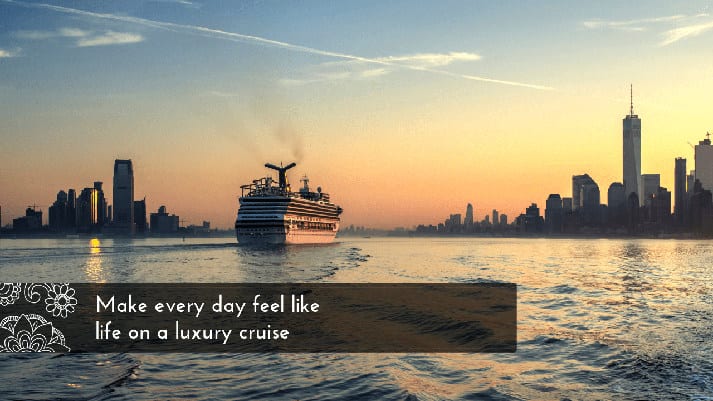A Sweet Sailing Life:
My Cruise Ship Analogy For Understanding Your Nervous System
Imagine a cruise ship sailing calm warm seas. You are on deck with the sun shining down on you. Attentive staff surround you, ensuring that you always have a cocktail in hand, preparing beautiful food, creating entertainment, or cleaning your room.
Think about how you feel on this cruise ship. Relaxed, calm, pampered, filled with easy deep breath.
Every staff member hired to work on this cruise ship has a single goal: your comfort. The smallest detail is important, “behind the scene” and “ front line” staff are catering to your guest experience. Ahh… the sweet ease of the cruise ship guest.
The PNS Cruise Experience
Let’s use this as a metaphor for our Parasympathetic Nervous System (PNS). The PNS takes care of bodily functions, creates great sleep, ensures your digestion and elimination is uneventful, and creates the overall feeling of well being.
The PNS is commonly referred to as the ‘rest and digest’ or ‘feed and breed’ side of the nervous system. Imagine it as your personal network of eager efficient staff doing all the work so that your day can be a beautiful sweet existence, just like days on a cruise ship. Our bodies have important “front line” and “behind the scenes” roles as well. Our PNS “staff members” have specific, necessary roles in keeping our operation appear effortless and easy.
Oh man… am I making you want to book a cruise? If it sounds divine, it is. Take a deep easy breath, relax. Feel that abundant sense of wellness? This is your PSN state.
Trouble on Board
What happens when your body doesn’t feel so effortless anymore? When it feels tired and lethargic, burnt out and run down? Maybe pain is creeping in or your sleep just doesn’t do the trick.
What is going on that is stopping our PNS staff from keeping everything running smoothly? One of the biggest disruptors of our PNS is the important and life-saving role of the Sympathetic Nervous System.
To explain, let’s go back to our cruise ship:
All staffers have a second role on a cruise ship dedicated to creating an amazing guest experience. The second role is their emergency role – in case the boat starts sinking. In such a situation, instructions are to drop their primary job and start saving lives, getting guests into life jackets and on to lifeboats.
How do you feel as a guest on this ship now? Anxious? Hyper-Alert? Scared? Stressed?
My bet is, even reading this, you are noticing that your breath is getting tight and your spidey senses are starting to tingle. Your bliss has been broken.

Man the Lifeboats
Our Sympathetic Nervous System (SNS) is the side of the nervous system commonly referred to as ‘fight or flight’. When we flip to SNS our staffers are literally ditching their primary roles and moving from the internal organs to offer more strength to the muscles and bones that are preparing to run, or fight, or facilitate whatever action is necessary to escape from the perceived emergency.
If the perceived danger is low we may still find that there are enough PNS front liners still operating, so that on the surface level we can pretend that all is fine. But behind the scenes the PNS jobs have been ditched. We experience SNS in our body as a physical reaction of heightened arousal, inability to relax, sweating, restricted breath, and/or tightening muscles.
This is not a fun place to live. We want off this particular cruise ship as fast as possible please, at least to return to safety. Only then can we work towards relaxation, ease, and that bliss again.
“A ship is safe in harbour but that is not what ships are built for.” – John A. Shedd.
Abandon Ship or Stay at the Dock?
Two things are important to note:
Number One: We can’t get off our ship.
We get one ship, one body – for life. Our body is our one and only vessel and we don’t get to trade it in for another one if this one sinks.
Number Two: We can’t stay safe in harbor all of our lives.
Avoiding risk and difficulty might be one way to stay in PNS. Keeping SNS at bay by limiting life experiences. Let’s face it, trauma, accidents, death, and stress all happen. They all create situations in our bodies that make it hard for our PNS to keep everything steadily ticking along.
Fear, both real and imagined, pulls our staff off their primary duties to fill their secondary roles of securing our safety. Only when this safety is assured can all staffers move back to their primary pampering roles.
Stop Your Ship from Sinking
The SNS is powerful, necessary, helpful, and will always do everything in its power to stop your ship from sinking. That is what it is meant to do. As this sinking ship metaphor is meant to demonstrate, it is an exhausting high alert state not meant to be experienced over long durations. It is meant to be the quick adrenaline rush that gets you back to safe ground, not halt the whole cruise, or impact your whole life.
Life will always throw us into situations where our SNS is key to our survival. It is important to know we can and will access this role every time we need it, AND we can do a lot to help our systems stay relaxed and happy in PNS.
When you understand this analogy you realize why it is crucial to keep your PNS robust, to carry out the primary functions of your body with enthusiasm and ease. Anything that stresses your PNS can divert staffers to their SNS role. No one wants this, just as no one wants to be on a cruise ship that is in an emergency situation.
How To Get Back to Sweet Sailing?
Take care of your staff so they are willing to work hard to provide the best guest experience. When your PNS staff is happy they are more able to detect issues before the SNS state takes over. Healthy PNS staff are clear, focused, intelligent workers able to problem solve and fix issues, maintaining things so that we are less likely to divert to SNS states because of internal issues.
Offer a great work environment, don’t ask for a lot of overtime, compensate staff properly.
What does that mean for the intelligent working cells of the body? Oddly enough the same as for the Cruise Ship Staff:
Guidelines for a Sweet Sailing Life
Good Working Hours: If digestion cells are there to help digest, don’t make them work 24 hours a day. Set limits on when you eat so they don’t have to work overtime every day.
A Focused Night Shift: Take care of your night shift a.k.a. sleep staff. These hard workers show up every 24-hour cycle to do the deep clean to prepare you for a good next day. If you cut into their time by staying up late, eating/drinking/working/stimulating everything, the day staff has to stay late and finish their work, obstructing and slowing the progress of the night shift. It all gets messed up. You need to sleep.
Honour Break Times: Your body sends you clear messages when it needs to drink, eat, eliminate, rest, move. Listen. Take breaks to support these simple things and your staff contentment levels really stay high.
Offer Perks: There is nothing like being recognized for a job well done to boost employee morale. Offer your conscientious cells an infusion of fresh oxygen filled breath, movement of any kind, glorious pampering massages, quiet restorative baths, bare feet grounding into grass. Do this and you are boosting morale.
Support Staff Warning Signals
All the consideration and care you give to your body is nurturing this PNS system. Take a one minute time out whenever you feel overwhelmed, stressed, anxious, zoned out.
Close your eyes, breathe, ask yourself, “What Do I Need Right Now?”
Allow your body, your PNS, to respond. Listen to the simple answers that arise. Here are the most common I hear:
- “I’m thirsty”
- “I need to pee”
- “I’m chilly. Can I put on some socks?”
- “Turn off the background noise” (car radio or TV)
- “Go to bed”.
- “A long soaky bath would feel nice”
- “Just sit and breathe a minute”
- “No more coffee”>
Most requests that come from your PNS are not rocket science, nor are they likely to disrupt your day. Key healthy habits equate to an internal employee benefits program, keeping staff satisfied and happy. They require your awareness, attention, and compassion.
Get On Board
Comment below what is the most common answer you hear that you keep ignoring. Writing it down will ensure you take note and listen next time it pops up.
If you would benefit from the services of a Wellness Coach or Like-Minded Community, please reach out to me or a Yoga Health Coach in your area.
What will you do to keep your ship sailing, enjoying the sunshine and satisfying ease-filled days?
What do you need right now?
About The Author

Jill Novak is the creator of “Your Good Day Guide”, an invitation to experience a good day each and every day with simple steps from Ayurveda and Yoga. Use Jill’s 4 Step approach to sync practical habits and breath-filled movement to guide your day. Jill has been practicing yoga for over 20 years, teaching for 8 years, and blending Yoga Therapy & Ayurveda into personal evolution for herself and her clients for the last 4 years.
special thank you to my Ayurveda teacher Mona Warner from Janati Yoga who made me redo lessons over and over again to understand subtle concepts, who even in this article redirected my thinking a few times. This writing is a reflection of how I currently understand these concepts in my metaphorical mind and is nowhere near a complete or nuanced reflection of the full wisdom of Ayurveda or Yoga.
Jill, and her husband Jason, are the parents of three teenagers, living in Cochrane, Alberta. They are currently feeling the pride & loss of seeing their son off to University, and experiencing the joy & drama of raising their girls as they become glorious young women. Jill loves solving the problems of the world on long walks with great friends, reading life-altering books, riding her bike with her hubby, and connecting with people who have a deep desire for personal evolution. Connect with Jill here and join her community on her Facebook and Instagram page.
Apply here if you want to get an exposure, learn about blogging and become a Yoga Health Coaching Blogger.


